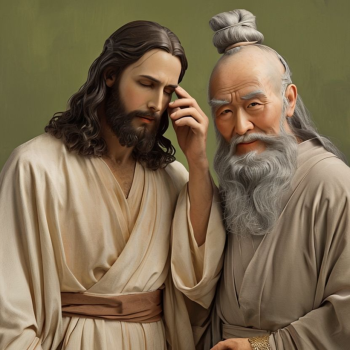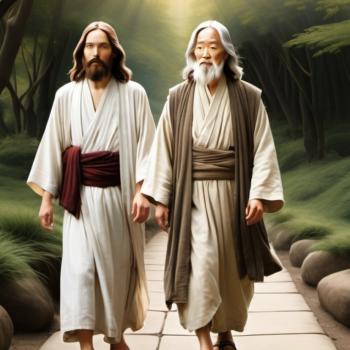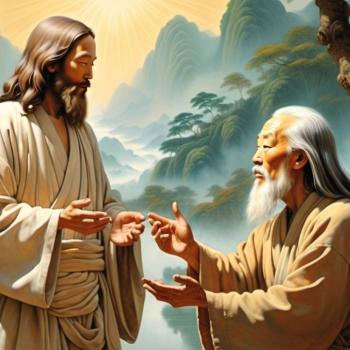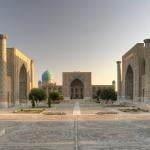Most people want power and recognition. But Jesus says that to be first, you must be last. To be whole, you must let yourself be broken.
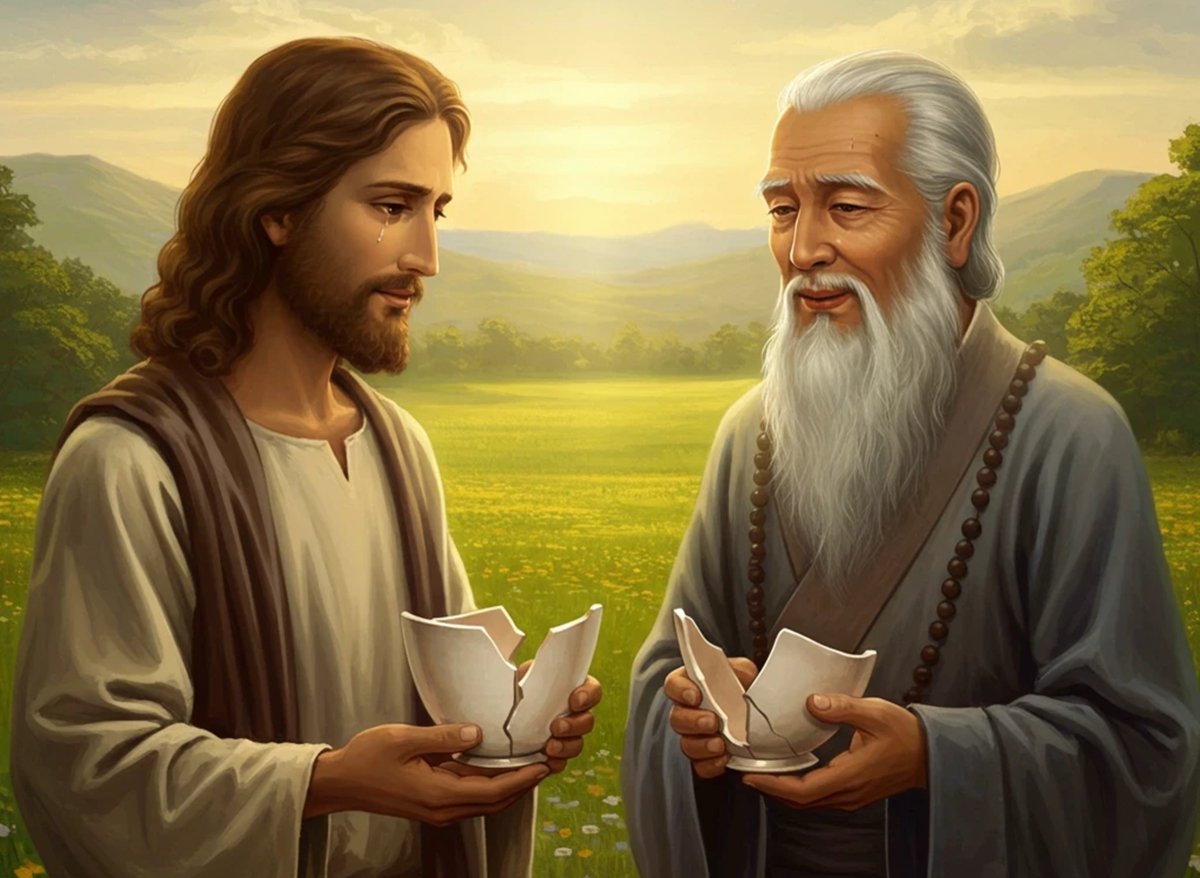
Whether it’s the place of honor at the family table, special recognition at church, or that promotion at work, everybody wants status and respect. But is putting yourself first consistent with the Tao of Love? The Tao Te Ching’s twenty-second verse addresses this.
Lao Tzu’s Tao Te Ching, Verse 22
J.H. McDonald Translation
If you want to become whole,
first let yourself become broken.
If you want to become straight,
first let yourself become twisted.
If you want to become full,
first let yourself become empty.
If you want to become new,
first let yourself become old.
Those whose desires are few get them,
those whose desires are great go astray.
For this reason the Master embraces the Tao,
as an example for the world to follow.
Because she isn’t self centered,
people can see the light in her.
Because she does not boast of herself,
she becomes a shining example.
Because she does not glorify herself,
she becomes a person of merit.
Because she wants nothing from the world,
the world can not overcome her.
When the ancient Masters said,
“If you want to become whole,
then first let yourself be broken,”
they weren’t using empty words.
All who do this will be made complete.
The Place of Prestige
Mark’s Gospel records two of Jesus’ disciples who ask to sit at his right and left side—in the place of prestige—when he enters his kingdom. Jesus warns them not to seek such positions of recognition. In just a few words, Jesus predicts the cup of suffering from which he will drink. He also foretells the martyrdom of his most ardent followers:
But Jesus said to them, “You do not know what you are asking. Are you able to drink the cup that I drink or be baptized with the baptism that I am baptized with?” They replied, “We are able.” Then Jesus said to them, “The cup that I drink you will drink, and with the baptism with which I am baptized you will be baptized, but to sit at my right hand or at my left is not mine to appoint, but it is for those for whom it has been prepared.”
In short, Jesus tells his followers that if there is a place of prestige in the realm of God, it isn’t for those who seek it. That’s because Heaven doesn’t value the same things we esteem. Though we don’t want to hear it, suffering plays a part in our spiritual development.
Paved with Suffering
In the Acts of the Apostles, we read about the Church’s worst persecutor who experiences a conversion on the road to Damascus. Now blinded, Saul awaits assistance. The Spirit of Jesus speaks to a believer named Ananias, sending him to Saul for help and healing. Ananias protests, reminding Jesus of the great harm Saul has done to the Church.
Jesus firmly but lovingly replies, “Go, for he is an instrument whom I have chosen to bring my name before gentiles and kings and before the people of Israel; I myself will show him how much he must suffer for the sake of my name.” Both of these stories illustrate Jesus’s understanding that the Way of Love is paved with suffering.
Let Yourself Be Broken
In verse 22 of the Tao Te Ching, Lao Tzu writes, “When the ancient Masters said, ‘If you want to become whole, then first let yourself be broken,’ they weren’t using empty words. All who do this will be made complete.” Like Jesus, Lao Tzu knows that suffering is the necessary path for all who follow the Tao of Love.
Let Yourself Become Twisted
The Taoist master continues, “If you want to become straight, first let yourself become twisted. If you want to become full, first let yourself become empty. If you want to become new, first let yourself become old. Those whose desires are few get them, and those whose desires are great go astray.”
Few people set out on the spiritual path by cinching up their belts and exclaiming, “I’m so excited—I get to suffer today!” That’s usually not the way it works. The mystic life offers many rewards. Otherwise, nobody would choose it. But sages accept that love does not come without pain, and peace requires a life of sacrifice. For Jesus and some of his disciples, this would mean a literal cross. Legend has it that Lao Tzu avoided a painful end, simply riding into the mist on an ox. But the sage’s life did not come without its sorrows. And Jesus says there is a cross we all must bear.
The Tao Seeks to Balance All Things
Likewise, Isaiah says that in order for God’s justice and comfort to be brought about, there must be a great leveling within their society. Only this way can there be balance.
Comfort, O comfort my people,
says your God.
Speak tenderly to Jerusalem,
and cry to her
that she has served her term,
that her penalty is paid,
that she has received from the Lord’s hand
double for all her sins.
A voice cries out:
“In the wilderness prepare the way of the Lord;
make straight in the desert a highway for our God.
Every valley shall be lifted up,
and every mountain and hill be made low;
the uneven ground shall become level,
and the rough places a plain.
Then the glory of the Lord shall be revealed,
and all flesh shall see it together,
for the mouth of the Lord has spoken.”
A voice says, “Cry out!”
And I said, “What shall I cry?”
All flesh is grass;
their constancy is like the flower of the field.
The grass withers; the flower fades,
when the breath of the Lord blows upon it;
surely the people are grass.
The grass withers; the flower fades,
but the word of our God will stand forever.
The prophet’s message is that God is in the business of straightening the crooked, lifting the suffering, and humbling the proud. Just as water seeks the lowest places, so the Tao seeks to balance all things. But you can only become balanced if you learn to be transparent about your imbalance. Only those with a history of suffering will have a testimony of how God restored them.
Brokenness Made Whole
The crucifixion is Jesus’s ultimate example of brokenness made whole. In the resurrection, Jesus’s twisted body became gloriously straight. Jesus’s soul reanimated a corpse that was as vacant as an empty cup. Death came to life. The grave itself was defeated. None of this glory could have been possible without the agony of crucifixion.
Do you want a minor solution? Have minor problems. Do you want to see God move mountains? The only way is to experience of adversity. To be sure, the loving Tao will make all things new and level once again.
Embracing the Tao
Lao Tzu writes, “For this reason the Master embraces the Tao, as an example for the world to follow. Because she isn’t self centered, people can see the light in her. Because she does not boast of herself, she becomes a shining example. Because she does not glorify herself, she becomes a person of merit. Because she wants nothing from the world, the world can not overcome her.”
As an example of this, Jesus embraces his Christ-nature, modeling humility and brokenness for the world to follow. Because he isn’t self-centered, people can see the light in him. He does not boast of himself, thus he becomes a shining example. Because he does not glorify himself, he becomes a person of merit. Jesus wants nothing from the world, so the world cannot overcome him. The light shines in the darkness, and the darkness does not overtake it.
The Mind of Christ
The author of Philippians says:
Do nothing from selfish ambition or empty conceit, but in humility regard others as better than yourselves. Let each of you look not to your own interests but to the interests of others. Let the same mind be in you that was in Christ Jesus,
who, though he existed in the form of God,
did not regard equality with God
as something to be grasped,
but emptied himself,
taking the form of a slave,
assuming human likeness.
And being found in appearance as a human,
he humbled himself
and became obedient to the point of death—
even death on a cross.
Therefore God exalted him even more highly
and gave him the name
that is above every other name,
so that at the name given to Jesus
every knee should bend,
in heaven and on earth and under the earth,
and every tongue should confess
that Jesus Christ is Lord,
to the glory of God the Father.
This glory is not because Jesus sought to exalt himself. It’s because Jesus served with humility, and because he suffered much, that he became so great a light. He did what Lao Tzu talked about and let himself be broken. And this is what he calls us to do as well—to embrace our Christ-nature by letting ourselves be broken.
Agents of Balance and Blessing
All who do this will be made complete. Jesus calls his followers to the same task. No, it likely won’t be a literal crucifixion. When Jesus says to his followers, “Take up your cross and follow me,” he means that they will do the same things that he did. The Tao is the great equalizer. Jesus, the Tao of Love made flesh, calls his followers to be agents of balance and blessing. God calls us to be levelers in our society—but first, we must be leveled ourselves. If we are to embrace our own Christ-nature, we must be prepared to endure some measure of hardship to bring Love into the world.
Ponder…
What is your relationship to suffering? Of course, no mentally healthy person enjoys pain—but do you find yourself going too far in order to avoid suffering? Many people spend too much of their time, money, and effort trying to insulate themselves from discomfort of any kind. Instead of fighting against suffering, consider how pain has shaped your life in positive ways.
- Has injury or illness taught you valuable lessons?
- Has struggle caused you to grow, emotionally or spiritually?
- Have you been able to help others, because you know what their agony feels like?
Often, when we resist pain, we cause ourselves more struggle. We clinch up, straining against a natural process. This, in turn, brings about an agony we might not have experienced, if we had simply allowed suffering to be what it is.
Ask yourself how you can benefit from giving up the fight against suffering. How can you gain by allowing pain to simply exist in your life, without resisting it? How can your acceptance of pain inspire others to find peace in their difficult circumstances? If you allow yourself to be broken, do you have faith that God will bless you with resurrection?










